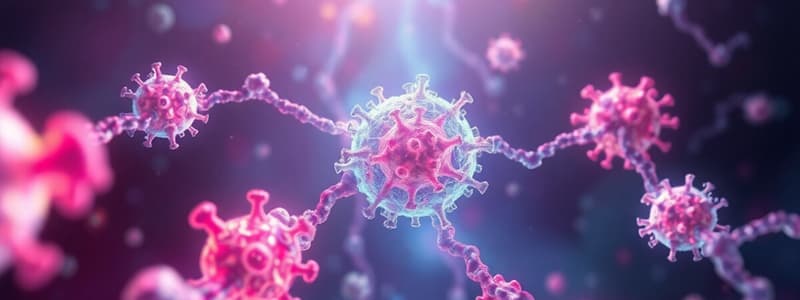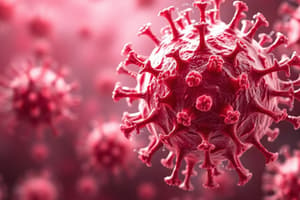Podcast
Questions and Answers
Which factor is most likely to influence the immunogenicity of an antigen in an individual?
Which factor is most likely to influence the immunogenicity of an antigen in an individual?
- The individual's diet
- The temperature of the individual's body
- The presence of the antigen in the environment
- Genetic variations in antigen receptors (correct)
Which type of antigen does not require helper T cells for B lymphocyte activation?
Which type of antigen does not require helper T cells for B lymphocyte activation?
- T-dependent antigens
- Protein antigens
- T-independent antigens (correct)
- Nucleic acid antigens
What is a primary characteristic of T-independent antigens?
What is a primary characteristic of T-independent antigens?
- They rapidly degrade in the body
- They have a polymeric structure with repeating antigenic determinants (correct)
- They are primarily nucleic acids
- They require helper T cells for activation
Which route of administration is commonly used for most vaccines?
Which route of administration is commonly used for most vaccines?
Why do some polysaccharides require conjugation to be considered effective immunogens?
Why do some polysaccharides require conjugation to be considered effective immunogens?
What role do adjuvants play in immune response?
What role do adjuvants play in immune response?
What is a common feature of T-dependent antigens?
What is a common feature of T-dependent antigens?
Which of the following types of antigens is typically considered weak?
Which of the following types of antigens is typically considered weak?
Which age demographic is generally expected to have the least capability to mount an immune response?
Which age demographic is generally expected to have the least capability to mount an immune response?
What distinguishes immunogens from haptens?
What distinguishes immunogens from haptens?
Which factor significantly influences the immunogenicity of an antigen?
Which factor significantly influences the immunogenicity of an antigen?
What type of antigen is primarily responsible for altering self-antigens in the context of immune responses?
What type of antigen is primarily responsible for altering self-antigens in the context of immune responses?
Which feature of antigens allows them to bind to receptors that produce an immune response?
Which feature of antigens allows them to bind to receptors that produce an immune response?
Which of the following statements about the size of antigens and their immunogenicity is accurate?
Which of the following statements about the size of antigens and their immunogenicity is accurate?
Which type of antigen requires a larger carrier molecule to effectively stimulate an immune response?
Which type of antigen requires a larger carrier molecule to effectively stimulate an immune response?
What role does phagocytosis play in the immunogenicity of antigens?
What role does phagocytosis play in the immunogenicity of antigens?
What is a superantigen's mechanism in stimulating the immune response?
What is a superantigen's mechanism in stimulating the immune response?
Which characteristic of antigens is critical for distinguishing self from non-self in the immune response?
Which characteristic of antigens is critical for distinguishing self from non-self in the immune response?
The structures that present antigens to the immune system are primarily part of which complex?
The structures that present antigens to the immune system are primarily part of which complex?
What characterizes superantigens in their interaction with T cells?
What characterizes superantigens in their interaction with T cells?
Which of the following statements about haptens is true?
Which of the following statements about haptens is true?
Which type of antigen is recognized as a natural constituent of the body?
Which type of antigen is recognized as a natural constituent of the body?
What is the result of polyclonal activation of helper T lymphocytes by superantigens?
What is the result of polyclonal activation of helper T lymphocytes by superantigens?
How do endogenous antigens differ from exogenous antigens?
How do endogenous antigens differ from exogenous antigens?
Which of the following accurately describes a superantigen's binding mechanism?
Which of the following accurately describes a superantigen's binding mechanism?
What is a key characteristic of autoantigens in the context of the immune system?
What is a key characteristic of autoantigens in the context of the immune system?
Which cytokines are commonly produced in excessive amounts due to superantigen activation?
Which cytokines are commonly produced in excessive amounts due to superantigen activation?
What describes the primary route through which exogenous antigens enter the body?
What describes the primary route through which exogenous antigens enter the body?
Which statement about superantigens is incorrect?
Which statement about superantigens is incorrect?
Study Notes
Superantigens
- Activate a large number of lymphocytes at the same time, in a non-specific manner.
- Mostly derived from bacteria and viruses.
- Bind to the variable domain of the β (Vβ) chain in the T cell receptor (TCR) of CD4+ T cells and the α chain of the MHC class II molecule on antigen presenting cells.
- This binding induces a strong signal that activates a large number of T cells, polyclonally.
- Polyclonal activation of helper T lymphocytes leads to excessive production of IL-1, IL-2, IL-6, TNFα, MIP-1α and MIP-1β which can lead to systemic toxicity.
Haptens
- Small non-immunogenic substances (e.g., metabolites of antibiotics).
- Cannot induce an immune response on their own.
- May induce an immune response only when conjugated to a carrier (such as a protein).
- Are considered incomplete antigens due to lack of immunogenicity.
Autoantigens
- Natural constituents of the body.
- Play a role in autoimmune reactions.
- Immune system reacts against host antigens.
Exogenous Antigens
- Antigens that enter the body from outside.
- Examples include inhalation or ingestion.
Endogenous Antigens
- Generated within cells as a result of normal cell metabolism.
- Can be generated due to viral or intracellular bacterial infection.
Factors Affecting Immunogenicity
- Foreignness: The immune system distinguishes between self and non-self substances.
- Size: Larger antigens can be more immunogenic.
- Chemical Composition: Complex molecules are usually immunogenic, due to greater diversity of antigenic determinants.
- Physical Properties:
- Particulate antigens are more immunogenic than soluble antigens.
- Denatured antigens are more immunogenic than native forms, as denaturation exposes more antigenic determinants.
- Degradability: Antigens that are phagocytosed and easily degraded are usually highly immunogenic.
- Genetic Factors: Some antigens are more immunogenic for certain species than others.
- Age: Young or old individuals may have a weaker immune response compared to middle-aged individuals.
- Route of Administration: Affects the strength of the immune response.
Chemical Nature of Antigens
- Proteins: The largest group of antigens, often highly immunogenic (including pure proteins, glycoproteins, and lipoproteins).
- Polysaccharides: Pure polysaccharides and lipopolysaccharides are usually good immunogens.
- Nucleic Acids: Weak antigens, but may become highly immunogenic when conjugated to proteins.
- Lipids: Generally not immunogenic, but some may act as haptens.
Microbial Antigen Introduction
- Infections: Microbial antigens are introduced into the body through infection.
- Route of Administration (Vaccines):
- Per os (oral)
- Intranasal
- Intramuscular
- Intravenous
- Intradermal
- Subcutaneous
Adjuvant
- A substance that enhances the body's immune response to an antigen.
Types of Antigens
- T-Independent Antigens:
- Directly stimulate B lymphocytes to produce antibodies without helper T cells.
- Examples include lipopolysaccharides.
- Properties:
- Polymeric structure (repeated antigenic determinant)
- Activate lymphocytes polyclonally
- Resistant to degradation
- T-Dependent Antigens:
- Indirectly stimulate B lymphocytes to produce antibodies.
- Require helper T cells for stimulation.
- Proteins are often T-dependent antigens.
- Have a few copies of various antigenic determinants throughout the antigen.
Antigens: Key Concepts
- Antigen: A molecule that induces an immune response when introduced into the body.
- Immunogen: A substance capable of stimulating an immune response.
- Hapten: A substance that does not induce an immune response on its own, but can when complexed with a larger molecule.
- Immunogenicity: The ability of an antigen to induce an immune response.
- Antigenicity: The ability of an antigen to bind to products of the immune response.
- Epitope/Antigenic Determinant: The specific part of an antigen responsible for inducing the immune response and binding to immune products.
Studying That Suits You
Use AI to generate personalized quizzes and flashcards to suit your learning preferences.
Related Documents
Description
Test your knowledge on critical immunological concepts such as superantigens, haptens, and autoantigens. This quiz covers their definitions, mechanisms of action, and implications in immune responses. Perfect for students in immunology or related fields!




